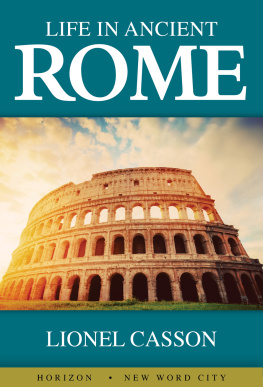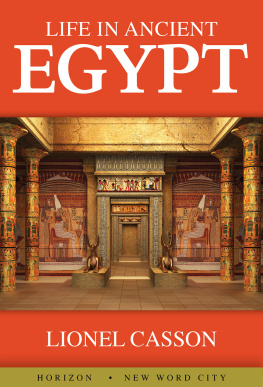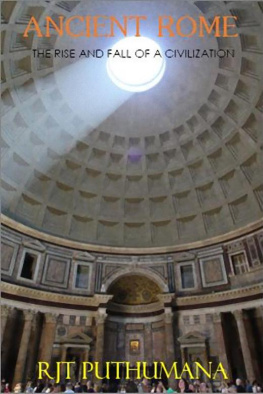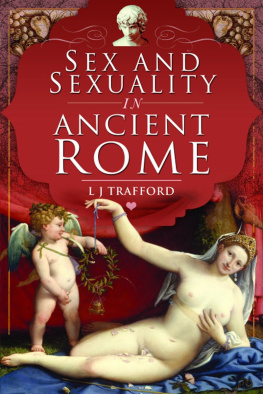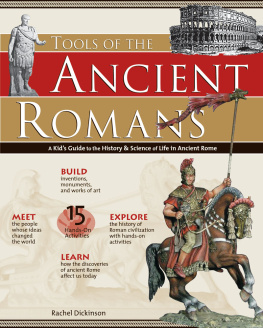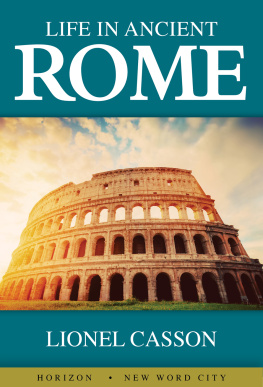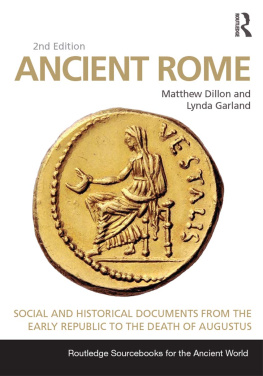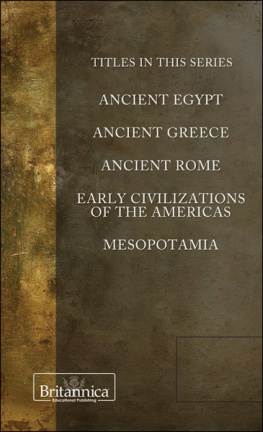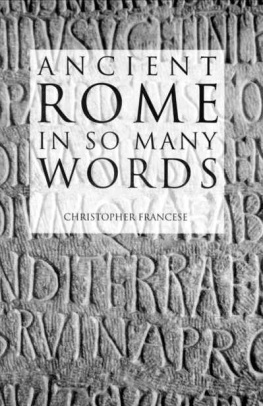Lionel Casson - Life in Ancient Rome
Here you can read online Lionel Casson - Life in Ancient Rome full text of the book (entire story) in english for free. Download pdf and epub, get meaning, cover and reviews about this ebook. year: 2015, publisher: New Word City, Inc., genre: History. Description of the work, (preface) as well as reviews are available. Best literature library LitArk.com created for fans of good reading and offers a wide selection of genres:
Romance novel
Science fiction
Adventure
Detective
Science
History
Home and family
Prose
Art
Politics
Computer
Non-fiction
Religion
Business
Children
Humor
Choose a favorite category and find really read worthwhile books. Enjoy immersion in the world of imagination, feel the emotions of the characters or learn something new for yourself, make an fascinating discovery.
- Book:Life in Ancient Rome
- Author:
- Publisher:New Word City, Inc.
- Genre:
- Year:2015
- Rating:3 / 5
- Favourites:Add to favourites
- Your mark:
- 60
- 1
- 2
- 3
- 4
- 5
Life in Ancient Rome: summary, description and annotation
We offer to read an annotation, description, summary or preface (depends on what the author of the book "Life in Ancient Rome" wrote himself). If you haven't found the necessary information about the book — write in the comments, we will try to find it.
. . . gracefully written - The New York Times
Award-winning historian Lionel Casson paints a vivid portrait of life in ancient Rome - for slaves and emperors, soldiers and commanders alike - during the empires greatest period, the first and second centuries A.D.
Life in Ancient Rome — read online for free the complete book (whole text) full work
Below is the text of the book, divided by pages. System saving the place of the last page read, allows you to conveniently read the book "Life in Ancient Rome" online for free, without having to search again every time where you left off. Put a bookmark, and you can go to the page where you finished reading at any time.
Font size:
Interval:
Bookmark:
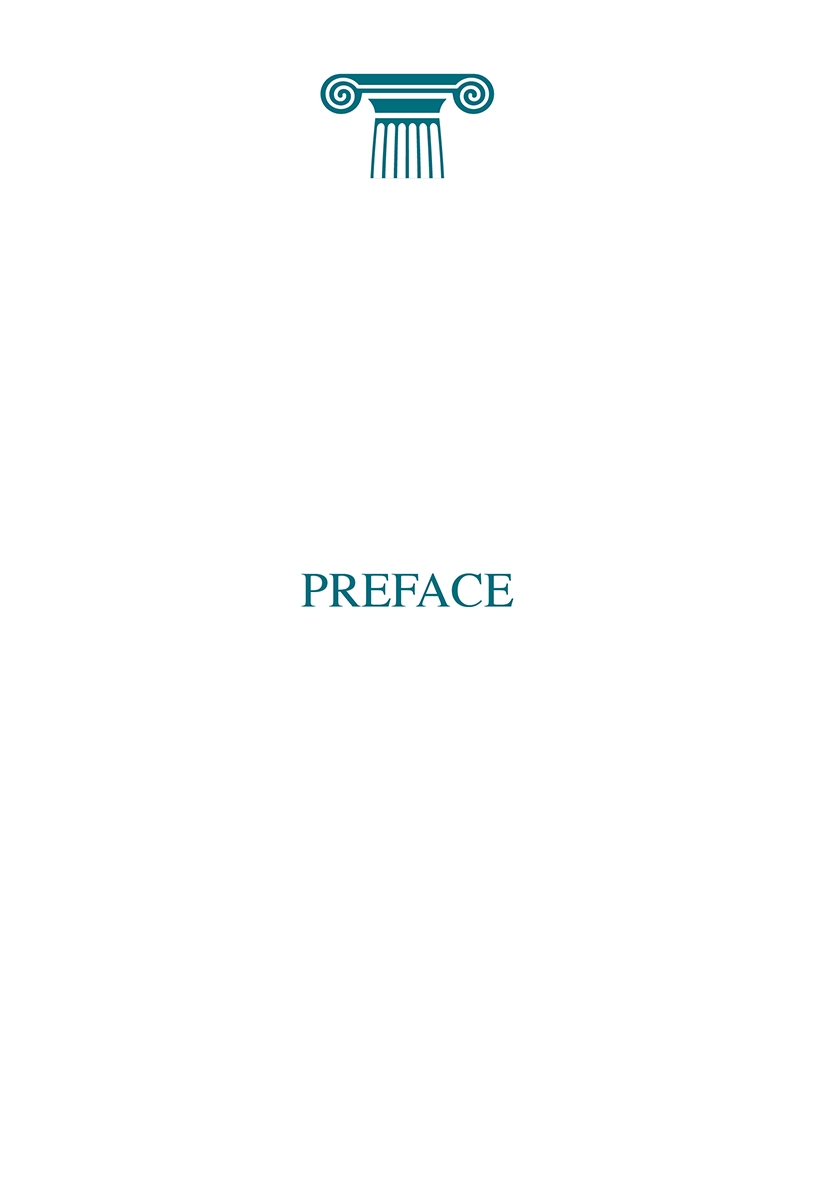
This book presents a series of concise sketches of key phases of life in the Roman world during its greatest period, the peaceful and prosperous years of the first and second centuries A.D.: what life was like in the city, in the countryside, on the road; what it was like in the various levels of society, from the slave to the aristocrat, from the soldier in the ranks to his commander in chief, the emperor; what gods people put their faith in, what amusements beguiled them. The sketches are fashioned to reveal how the inevitable cycle played out in the circumstances of this very special age.
When sums of Roman money are quoted, they have alongside them an amount in dollars to give some idea of the equivalent purchasing power. These amounts are by no means to be taken as exact. Converting ancient values into modern is highly speculative; what I offer are little more than guesses based on the handful of useful indications of ancient wages and commodity prices that have survived. I am fairly certain, however, that they do not overestimate, although they may underestimate.

In the second century of the Christian Era, the empire of Rome comprehended the fairest part of the earth, and the most civilized portion of mankind. The frontiers of that extensive monarchy were guaranteed by ancient renown and disciplined valor. The gentle, but powerful, influence of laws and manners had gradually cemented the union of the provinces. Their peaceful inhabitants enjoyed and abused the advantages of wealth and luxury.... During a happy period of more than fourscore years, the public administration was conducted by the virtue and abilities of Nerva, Trajan, Hadrian, and the two Antonines.
These are the words with which Edward Gibbon opens his monumental history. They paint a picture of material well-being whose colors, though perhaps too bright, are not false. It, indeed, was an age of peace and prosperity, thanks to the honesty and efficiency of Romes government, the extent of its sway, and the strength of the armies with which it defended all it held.
The Mediterranean, most of what is today France, Spain, Belgium, Holland, the Balkan countries, even the better part of the British Isles, was one world politically, all under the rule of the Roman Empire. Any inhabitant could make his way from the burning sun of Mesopotamia to the mists of Scotland without crossing a national frontier. The founder of this vast realm, the man who welded it together, fashioned its machinery of government, and launched it on its incredibly long career, was Augustus, the grandnephew of Julius Caesar.
Augustus rode to power on the waves of bloody civil war, a series of large-scale bitter conflicts in which he first destroyed his great-uncles assassins, Brutus and Cassius, and then his own partner in this success, Mark Antony. When, in 30 B.C., the latter fell on his sword and his celebrated supporter pressed an asp to her bosom, Augustus was left in sole command of the Roman world. From the arts of war he turned, with equal ability, to the arts of peace. And since fate kindly granted him almost half a century more of life, until A.D. 14, he was able to get the new arrangements he devised for governing Rome working smoothly and surely.
What he created was, basically, an autocracy - but one that functioned behind the faade of a republic. From roughly 500 B.C. to 50 B.C., when Julius Caesar in effect brought it to an end, Rome had been a republic. Its chief legislative body was a Senate (whose membership, though theoretically open to all, tended to be mostly drawn from the aristocracy), its chief executive a pair of annually elected consuls. Under Augustus, the consuls and other magistrates of the republic continued to hold office, the Senate to sit regularly and deliberate and pass motions. But the reins of power, no doubt about it, were in Augustuss grasp. It was he who controlled the army and navy, who determined foreign and domestic policy, whose favor made or broke political careers, who appointed the administrators to run Romes provinces, as the overseas possessions were called, who above all stood for the government in the eyes of both citizens and subjects. His face appeared on the coins they handled, his name was prominent on public buildings and monuments, and in all major communities, there were temples where he or his genius, his spirit, was worshiped. He was an emperor in all but name; he discreetly insisted on being called by the informal title Princeps, a neutral term that meant only First Citizen.
Augustus did his work so well that those who followed him on the throne - Tiberius, Claudius, Nero, Vespasian, and on through the great emperors of the second century A.D. whom Gibbon singled out for mention - merely adjusted or adapted but never basically changed what he had wrought. Obviously, there was no place in the system for freedom of speech or similar precious political rights that autocracy cannot countenance; on the other hand, infinitely more people enjoyed social and economic freedom than ever had under the republic. Moreover, Rome was, by and large, lucky in the quality of the rulers that came to the throne. Augustuss successors for the next 200 years were all men of ability and, with a few exceptions, men of integrity. Even the few exceptions caused no fatal damage, since the governmental machinery continued to work in spite of them: A Caligula could spread terror in the capital with his insanities or a Nero helpless exasperation with his inanities, but the bureaucracy they headed went right ahead doing its job, collecting taxes, administering justice, carrying on the imperial correspondence, paying the imperial salaries - attending, in short, to the day-to-day needs of the state.
The key to the emperors power - and to the peace enjoyed by the diverse peoples he ruled - was Romes efficient armed forces. Before Augustus, Roman armies and navies had been called up as needed; Augustus created a standing army and navy, with himself as commander in chief. This was a potentially dangerous instrument, and the time would come when the imperial armies made, rather than obeyed, emperors. But that lay far in the future. The rulers of the first two centuries A.D. used the armed forces with care and intelligence - the army to conquer and guard, the navy to keep the sea lanes free of pirates.
The emperors lived in great palaces that they built for themselves on Romes Palatine Hill. These included not only their living quarters but the grandiose halls where they held court and the offices where their bureaucracy carried on the daily routine of government. Italy enjoyed a privileged status as Romes historic heartland and the source of the superb soldiers that had enabled it to conquer the Mediterranean world, but Romes strength now lay in its provinces; from these it drew the major portions of its wealth, brains, and muscle. The grain and wine and oil that fed its armies and civil servants came from Egypt and France and Spain; the businessmen who maintained its active commerce were largely provincials; and the army, though its core was still Italian, was increasingly recruited from the provinces, while provincials officered, as well as manned, the navy. By the second century A.D., the emperors themselves came from the provinces: Trajan and Hadrian were both of Spanish extraction. The head of state had to be as concerned for the political and economic health of Gauls, Arabs, Egyptians, and so on, as of Romans or Italians. When an ambitious provincial governor forwarded to Tiberius more in taxes than the stipulated amount, the emperor snapped that he wanted his sheep sheared not skinned.
Font size:
Interval:
Bookmark:
Similar books «Life in Ancient Rome»
Look at similar books to Life in Ancient Rome. We have selected literature similar in name and meaning in the hope of providing readers with more options to find new, interesting, not yet read works.
Discussion, reviews of the book Life in Ancient Rome and just readers' own opinions. Leave your comments, write what you think about the work, its meaning or the main characters. Specify what exactly you liked and what you didn't like, and why you think so.

